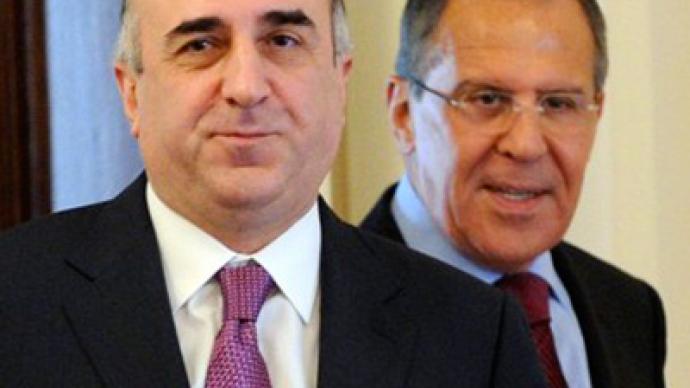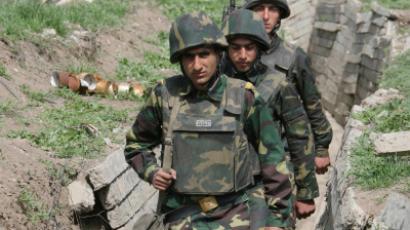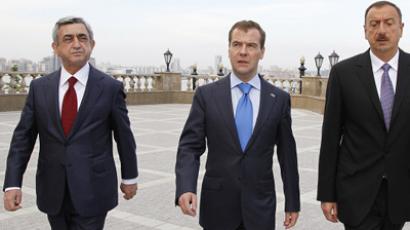Russia pushing for resolution to Nagorno-Karabakh conflict

Azeri President Ilham Aliyev passed his proposals to Moscow regarding a resolution to the Nagorno-Karabakh settlement process, which has taken on renewed urgency following last month’s presidential meeting in Kazan.
The Azeri president’s proposals were handed over to Russian Foreign Minister Sergey Lavrov on Monday by his Azeri counterpart Elmar Mammadyarov.Lavrov explained that, following a meeting between the Russian, Armenian and Azeri presidents in Kazan this past June, President Dmitry Medvedev instructed him "to hand over additional proposals to Baku." "Which I did,” Lavrov told a press conference in Moscow after talks with Mammadyarov. “Today I have received proposals from the Azeri president in response." Lavrov and Mammadyarov will work to find ways of resolving the conflict, which has been a regional irritant ever since a ceasefire was drafted following the Nagorno-Karabakh War (February 1988 to May 1994). The armed conflict pitted ethnic Armenians of Nagorno-Karabakh against Azerbaijan in a bitter war of secession. Up to 230,000 Armenians from Azerbaijan and 800,000 Azeris from Armenia and Karabakh have been displaced as a result of the conflict. Russia brokered a ceasefire that was signed between the belligerents in May 1994, while peace talks, mediated by the OSCE Minsk Group, have been held by Armenia and Azerbaijan ever since. During his visits to Baku and Yerevan on July 8, Lavrov handed over to Ilham Aliyev and Armenian President Serzh Sargsyan the messages, which spelled out the Russian presidential initiative for settling the Karabakh conflict. Baku and Yerevan pledged to review the documents and respond accordingly.Political observers recalled that during the trilateral summit, which was hosted by President Medvedev in Kazan, the talks failed to produce the basic principles of a settlement. Now, diplomats involved in the peace settlement are hoping that "fresh ideas from the Russian leadership will help promote the peace process and put it on the right track."Azerbaijan talks tough on peaceIt is time to start drafting a peace agreement between Azerbaijan and Armenia, Mamedyarov said at a Monday press conference after a meeting with Lavrov.“It is high time [to do it]. We must start drafting the peace treaty. Yet we have to wait for an Armenian answer," the Azeri foreign minister said, as quoted by Interfax."On the whole, Azerbaijan believes that progress [in the peace process] is obvious and it is confirmed by the Kazan statement,” he said. “Everyone would like a breakthrough, but our progress has been steady and everyone is beginning to realize that the current situation does not satisfy anyone, including the intermediaries: the United States, France and Russia.”"I think that our neighbor [Armenia] is unsatisfied with the current situation as well," Mamedyarov said.Meanwhile, Lavrov emphasized that this was a document that showed the political will of the two sides in ending the conflict."The draft’s fundamental principles – this is a truly political, rather than juridical document – start with the words: the Presidents of Armenia and Azerbaijan have decided to begin the drafting of a peace treaty – and then the principles of the peace agreement we are coordinating will be defined," Lavrov said."There is no consensus on certain settlement principles so far, but we must keep working," he said. "It is a common opinion of the co-chairmen that the coordinated political document would have a very important role in further work on the peace treaty.”The Russian Foreign Minister then alluded to the necessity of adhering to the agreed principles of a ceasefire, mentioning the threat of snipers in the region and “other measures.”Snipers and rigged toys“Currently, the provision of the ceasefire regime requires much greater attention or, if you like, much greater insistence," Lavrov said."We understand that any confidence-building measures must be mutual. Whenever I speak about the withdrawal of snipers and other measures, I convey the position of all the co-chairmen. We are speaking about the withdrawal of snipers on both sides," he said.Along these lines, Russia is demanding a thorough investigation into the death of an Azeri girl in the region bordering Armenia, because she was a resident of St. Petersburg, Lavrov said during the press conference."We are interested in being informed about the investigation, as, judging by the media reports, the girl and her mother lived in St. Petersburg. Our authorities hope for interaction with the Azeri authorities," he said.Aigyun Shahmaliyeva, 13, found a toy dog in the Tovuz River on July 14 and brought it to her home in the Azerbaijani village of Alibeili in the Tovuz district. The bomb exploded while the girl was playing with the toy. According to Azeri medical officials, the girl died on the way to the hospital. The explosion also injured the girl's mother, whose condition is said to be serious.A similar incident occurred in 1994 when two children died and another one was wounded from the explosion of a bomb which had been inside of a toy."Any acts of violence on the border between Armenia and Azerbaijan, along the contact line in Karabakh and the rest of the border, require a very thorough investigation," Lavrov stressed."As far as I know, the Azeri authorities have opened a murder case, but it takes a court hearing to define the case as a murder, a terror act," he said.Lavrov said that measures must be taken to prevent similar grievous events from occurring in the future.Robert Bridge, RT














